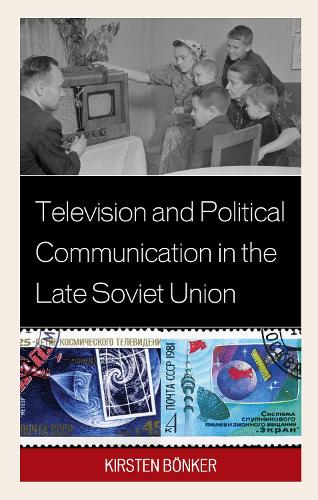
Television and Political Communication in the Late Soviet Union
(Hardback)
Publishing Details
Television and Political Communication in the Late Soviet Union
By (Author) Kirsten Bnker
Bloomsbury Publishing PLC
Lexington Books
4th June 2020
United States
Classifications
Professional and Scholarly
Non Fiction
Communication studies
302.2345094709045
Physical Properties
Hardback
294
Width 158mm, Height 234mm, Spine 22mm
572g
Description
This study focuses on Soviet television audiences and examines their watching habits and the way they made use of television programs. Kirsten Bnker challenges the common misconception that viewers perceived Soviet television programming and entertainment culture as dull and formulaic. This study draws extensively on archival sources and oral history interviews to analyze how Soviet television involved audiences in political communication and how it addressed audiences emotional commitments to Soviet values and the Soviet way of life. Bnker argues that the Brezhnev era influenced political stability and brought an unprecedented rise of the living standards, creating new meanings for consumerism, the idea of the home, and private life among Soviet citizens. Exploring the concept of emotional bonding, this study engages broader discussions on the durability of the Soviet Union until perestroika.
Reviews
In this perceptive, deeply researched book, Kirsten Bnker weaves together archival sources and oral history interviews to provide a unique insight into the history of Soviet television, as seen and experienced by Soviet audiences. The decision to switch attention from issues of governance and control over television to questions of consumption of everyday life leads Bnker to complicate easy dichotomies between work and leisure, private and public, oppression and resistance. In her analysis, television emerges not only as a key ingredient of everyday life, but also as a medium that succeeded in sustaining an emotional commitment to a Soviet way of life, and thereby contributed to the longevity and stability of communist rule. A powerful testimony to the importance and benefits of audience history, Television and Political Communication in the Late Soviet Union promises to have decisive impact on our understanding of Soviet television, and of media cultures in state socialist countries more generally. -- Sabina Mihelj, Loughborough University
By focusing on the viewer experience, Kirsten Bnker fills an important gap in our understanding of the late Soviet public sphere and sheds interesting light on the relationship between authoritative discourse and popular mentalities. Her nuanced and deeply researched account challenges common assumptions about Soviet television, revealing it to have beenat least partiallya success story. -- Stephen Lovell, King's College London
Based on extraordinary research in the Soviet archives and on extensive interviews with Soviet television viewers themselves, this rich and compelling book lets us get to know Soviet television through the voices of Soviet people. We learn what it was like to bring home a first television set, arrange your home and daily routines around it, and experience the powerful feelings and identifications this new medium evoked. Kirsten Bnkers incisive and original account demonstrates decisively that the experience of watching Soviet TV was not reducible to the black and white of conformity and dissent, and that the emotional ties Soviet TV fostered continue to shape post-Soviet Russian cultural and political life. -- Christine E. Evans, University of WisconsinMilwaukee
Author Bio
Kirsten Bnker is visiting professor of East European history at the University of Gttingen and research fellow at the Gerda Henkel Foundation.
